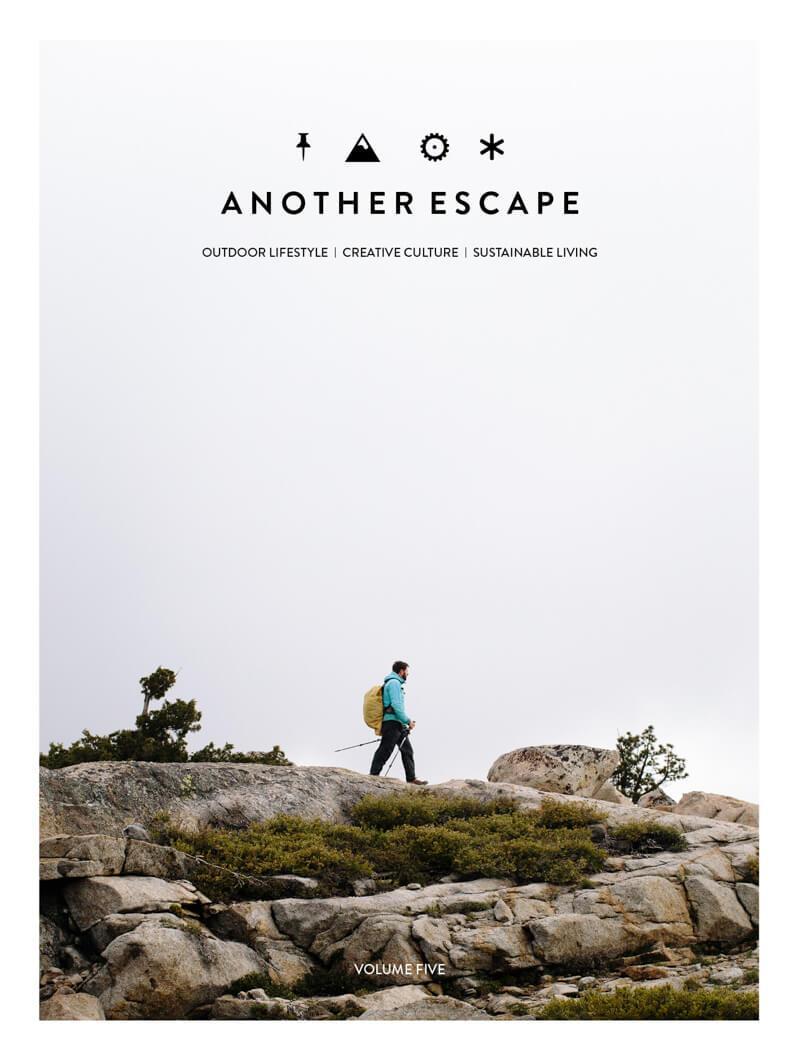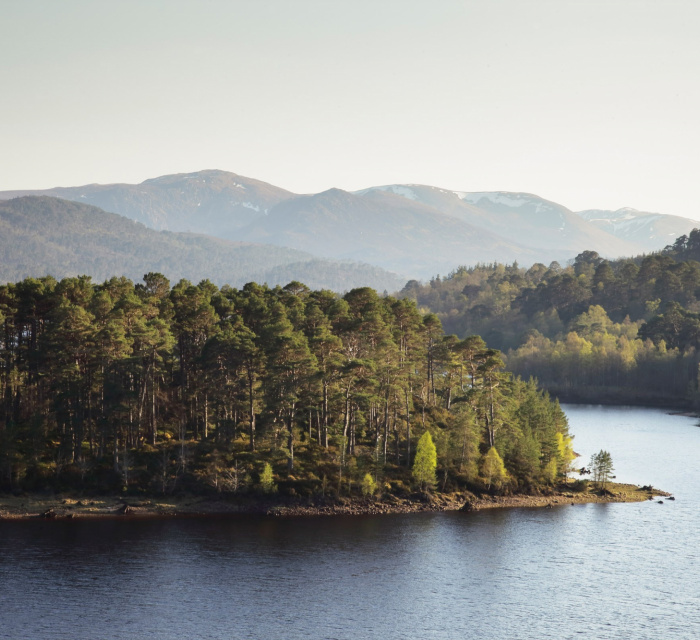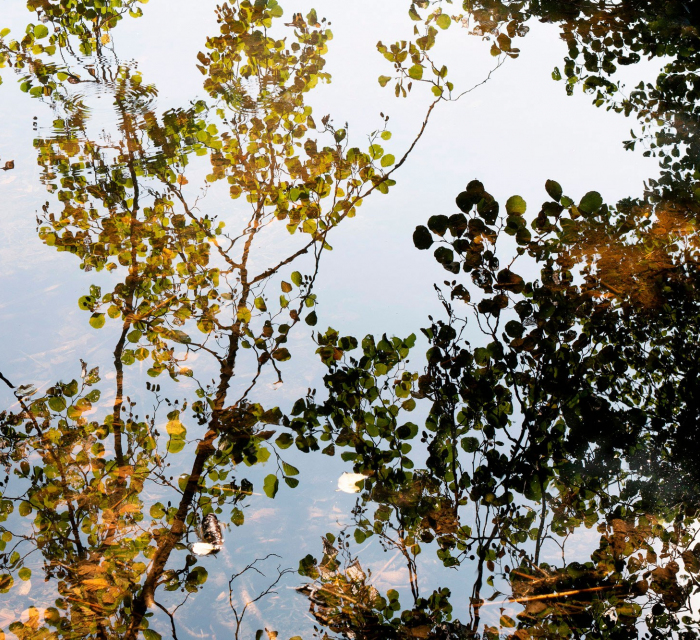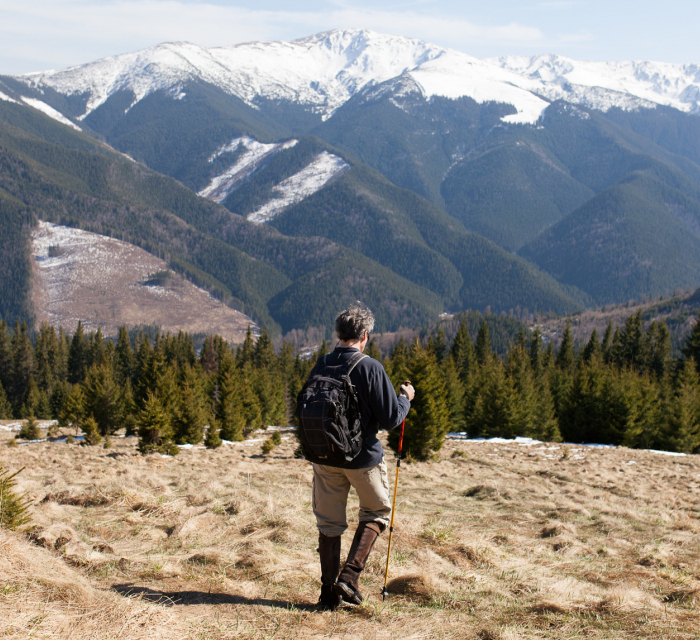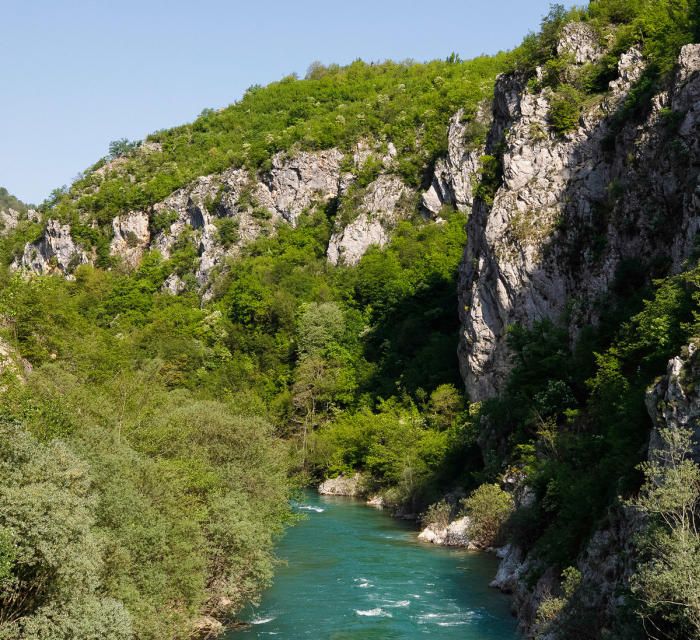The warm glow of the rising sun danced through the surrounding pine trees, casting a kaleidoscope of shadows through the van window. The fresh Arctic forest enticed us out from under the duvet, and we slid open the van door to the sweet smell of pine sap and the sound of the river rolling over pebbles at its banks. Embers were still warm from the night before and Angus stoked up a fire to heat water for tea, while Jella, our dog, investigated the shallows for our morning swim and I headed into the forest to forage for breakfast. There, the trees were sunk into a thick carpet of berries: wild blueberries, crowberries and ripening lingonberries. Jella caught up with me and snuffled around like a truffle-hunting pig, eating berries off the bush. With purple mouths, snout, hands and paws, and bags and pockets full of fruit, we spent the morning tending to a batch of jam that bubbled over the campfire. In the coals beneath, we baked the last of the mackerel we’d caught in Norway and sat quietly, hoping to spot a wandering elk.

The Road Taken
Holly Gable and Angus Fulton exchanged their city life for a life on the road. Through work exchanges, they have learnt skills and knowledge on self-sufficient living and eco-building. But more than that, they have learnt about themselves, the power and contagiousness of kindness, and the profound happiness that comes through helping and sharing.
Words by Holly Gable, Photography by Holly Gable and Angus Fulton


We were approximately 200 kilometres north of the Arctic Circle, not far into Sweden from its border with Norway. We had been journeying slowly through endless pine forests for hundreds of kilometres, living our days quite differently to those of our London-lives two years previous. We are two artists, Holly and Angus, who grew tired of the capitalist cuts, relentless rush, and suffocating aura of London’s competition, and for the cost of two months rent in Peckham, we found that we could buy somewhere to live, rent free, with wheels. So in January 2014, Angus disappeared into the depths of Norfolk and returned in the middle of the night with a green VW LT35 van.
With a lot of internet learning and making it up as we went along, we cleaned up rust, filled in holes with fibreglass, lined the entire inside with silver bubble wrap insulation, and, once sanded down and varnished, re-fitted the original wood panelling. Whilst shuddering, we took an angle-grinder to the walls and ceiling to cut holes for vents and windows. We built storage benches, cupboards, a cooking unit, a table that collapses into a bed, and cubby holes from bits of wood salvaged from Peckham’s pavements. We installed a gas stove, wired up a solar panel, and lined the door interiors with a roll of brand new, purple felt carpet found in a Hackney skip. A home had begun to emerge.
———————



One sunny May morning, in our new home, we crossed from Dover to Calais and onto mainland Europe. We spent our first summer of van-living with little plan other than to explore, slowly, France, Spain and Portugal. We enjoyed getting wonderfully lost and not so wonderfully lost avoiding toll routes and following (as well as swearing at and throwing at the windscreen) out-of-date maps. We slept alongside surging Pyrenees rivers, forest lakes, Atlantic coast beaches, in mosquito swarms on salt flats, in a good few car parks and, unknowingly, in a popular dogging spot. Mid-July we found ourselves at Nowhere, a no-commerce festival in the middle of a stormy desert in Spain, where everything, from cocktails to yoga classes to life drawing, was shared or gifted. It was a temporary town of dusty friends that truly lived and breathed “all that is mine is yours”.
We were no longer ruled by the morning alarm clock or that overbearing manager at work, and mostly we rose with the sun and slept when it set. But our days weren’t without some necessary order: looking for somewhere quiet, beautiful and/or interesting to park our home for the night required considerations, like where to find water for drinking and washing, and where we could go to the toilet. Living in a small space on wheels taught us quite quickly to slow down, in all aspects of life. The times we rushed were the times we got irritable or drove off leaving a shoe behind.


We had the freedom to move anywhere but with the familiarity and security of taking our little home with us. This freedom didn’t come without the occasional unpleasant surprise, like the time we drove our three-and-a-half-ton home onto unknown ground by a lake miles from civilisation without first checking that the ground wasn’t a deep sand pit. This wasn’t the only time we got stuck, each time in varying levels of apparent disaster. But, one way or another, every problem has a solution, and the past few years have empowered us with the sense that if you set your mind to it and have a willingness to ask for help, you are capable of almost anything.
———————
Our first months of free wandering were joyful, with some exciting twists and turns that arose from taking each day as it came. But as autumn drew to a close, we acknowledged an unexpected feeling in the back of our minds: a tugging sense that our days were lacking in a sort of deeper purpose. Some of our physical needs were being tested too, and as cosy as candle-lit evenings with rain hammering down on the metal roof were, the van has no form of heating and no place for wet clothes to dry. So when the rain started falling for weeks at a time, things got a bit damp.
In search of warmth and purpose, we joined a work-exchange project halfway up Portugal’s highest mountain in the Serra Da Estrella mountain range. Converting ruins into a retreat space for minority communities, we took part in windy roof scrambling and rope throwing missions to tarp up the leaking rotten roof so that the newly installed wooden floor wouldn’t get ruined in the downpours. We dried off from the rain with chutney-making and laughter, everyone squished together around a wood-burning stove in a little stone room built into the bedrock. That winter also led us to Jella, one of the puppies of an abandoned stray, and the two of us became three. Her joyful exploration has since led us on daily adventures. She teaches us to embrace every moment, appreciating the world around us as fully and playfully as possible.
From that winter onwards we have spent almost all of our time on work-exchange projects, trading our help for food and living space. In return, we’ve had rich experiences with different cultures, communities, and stuffed our brains and bodies with knowledge of natural building and self-sufficient living. We’ve discovered ways of living that aren’t dominated by money and competition, where value is put upon gift and exchange to deepen interpersonal connection and equality. Through these experiences, we’ve learnt our most affecting lesson: the power and contagiousness of kindness, and the profound happiness that comes through helping and sharing. We’ve been welcomed into lives, homes and communities with warmth, and discovered that kindness really can be found everywhere.
———————




While travelling between eco-villages in Denmark, we stumbled across The Self-Sustaining Village, and there we approached a man to ask if it would be ok if we parked and slept in their village carpark for the night. “Of course! And would you like something to eat tonight? We have a group meal at 6 pm; come along, it’s in the old farmhouse.” A little taken aback by the offer, we asked if he was sure and whether we should bring something. “It’s ok, I’ve invited you,” he replied. We arrived promptly and, sitting on one of the long bench tables in the farmhouse yard, ate a spectacular dinner of pulled pork, fresh bread, salads and chocolate cake. Nothing was asked or expected of us in return – although we hung around and helped with the washing up. In the eco-village, each family had built its own unique, experimental house: straw bale homes, wooden homes, tiny homes, container homes, entirely-recycled homes, geodesic-dome homes, no-right-angles-allowed homes, homes built inside of greenhouses... The food is communal; they grow as much as they can, each person contributing 4 hours a week to the farm, and they buy all non-grown produce wholesale as a group. Every evening at 6pm a dinner is served; it rotates as to who cooks, so on average each adult cooks once every 15 days, for 60 people.



From Denmark we travelled north, approximately 2000 kilometres through Sweden and Norway, via fjords and ferries, otherworldly glaciers, and 8-kilometre long mountain tunnels, up toward the midnight sun. On Engeløya, Angel Island, Norway, we met Eva, Clive, Astrid and Odin, a Norwegian-English family of artists, designers and filmmakers, at their timber-house overlooking the harbour. Within hours of arriving, seven of us plus two dogs crammed into their little boat. Overladen, we headed off around the peninsula on an evening trip to Lundøya island, spotting en route porpoises surfacing for air. In front of us, the Lofoten Islands drew a continuous seismogram across the horizon, and in the late night daylight we watched the sun dip down for a midnight dance with the island peaks before returning to the sky.
Following afternoons of painting barns with home-brewed iron oxide, linseed oil and rye flour paint, we had special dinners of fresh mackerel caught off the pier, wild reindeer and elk. That far above the Arctic Circle, the organic vegetable garden gave huge radishes, beetroot, spinach, asparagus and a daily basket-full of salad – something to do with the Gulf Stream, 24 hours of light, and Eva. Eva is an activist baker and bacterial collaborator, and with her fridge stacked full of bowls of bacterial cultures and jars of ferments, she taught us about the importance of bacteria – our bodies are half human cells and half bacterial – and led us to think about how collaboration within microbe colonies could inspire sustainability in human cultures.

As our second winter approached we discovered that Finland and Estonia do forest huts really well – free-to-use log cabins with fire pits, cooking stoves, log stores, compost toilets, sleeping decks, and usually a discarded sausage or two in the bins for Jella. London awoke our bin-foraging instincts, and now we can’t drive past a supermarket bin without slowing to see what treasures may await. At Solbacka, an eco-village in a forest in Finland, Sunday night was ‘bin night’, and we’d lift near to €1000s’ worth of food and drink from the local town supermarket bins. Mostly organic produce, all edible and much packaged in plastic, depressingly ready for landfill, was intercepted and the village was fed for the week. The Finns are true hunter-gatherers, and, as well as bin foraging, they taught us a lot about forest foraging for mushrooms and berries.
At Solbacka eco-village, natural-building workdays often ran enthusiastically into the dark, stacking cordwood walls from huge tree-trunk logs, stamping straw, sand and clay together into cob and sculpting that cob around straw bales, or clambering around the roof with a nail gun, fixing external boards to the timber house ready for winter. Our bodies and minds were rewarded with the shared ritual of mealtimes and the sacred sauna space, a place of softening, calm contemplation, and sitting together in quiet celebration of our interdependent existence with nature.
Sculpting a house using natural materials – a home that looks and feels as if it has grown from the earth itself – is food for the soul, and we started to dream of creating our own more rooted space. Christmas approached and family beckoned, so we made our way across Europe, from east to west, to Portugal.


In Portugal, where land is relatively cheap, the surf is good, the people and weather are warm and easy-going, we have been stationary for a while, digesting what we’ve experienced and putting some of our new skills and knowledge into practice. We’ve been able to buy a three-hectare plot, upon which we are creating a space to share what we’ve learnt with others and to further our own learning. Our van-home stays with us, but by not moving too far from one place for a while we will get to experience the evolution of a project, over time and through the seasons. Our aim is to live simply, to explore and experience, to create, to help and experiment, and to gain a greater connection with communities and the natural world. We hope that our journey inspires others on theirs, as others’ have inspired us on ours. •





















